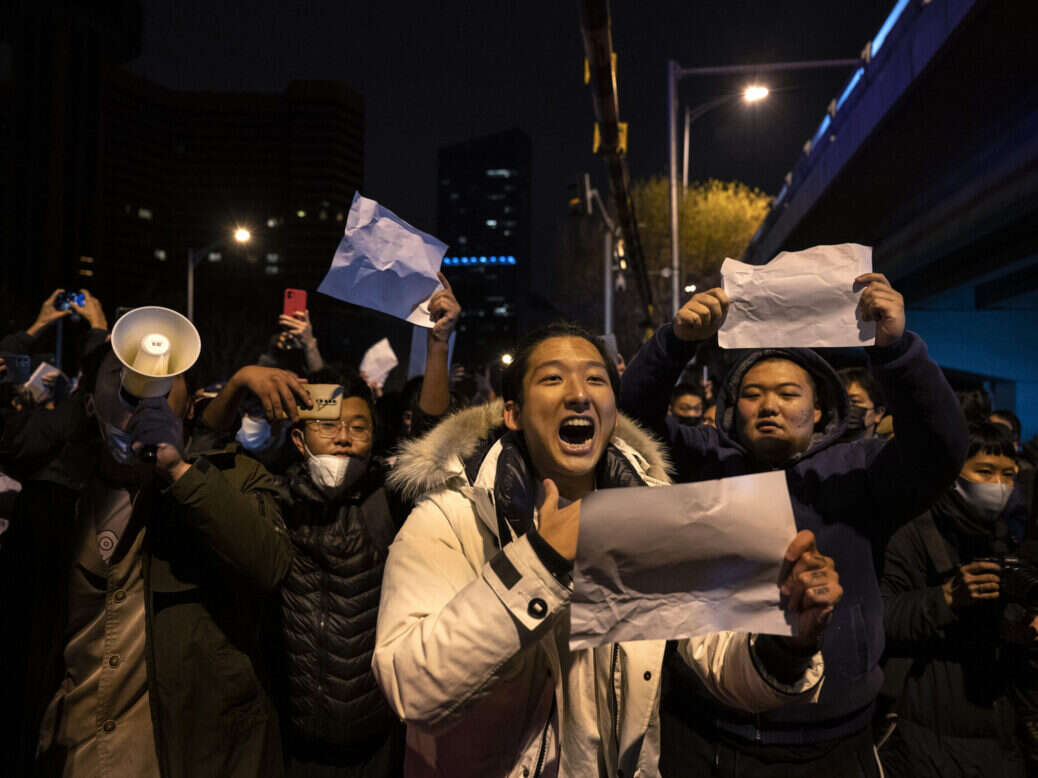
A BBC journalist was “beaten and kicked by police” before being arrested during protests over Covid-19 measures in China.
The broadcaster said it was “very concerned” after confirming journalist and cameraman Edward Lawrence of its China bureau “was attacked” in Shanghai on Sunday.
Footage on social media showed him being dragged to the ground in handcuffs, while he was seen saying in another video: “Call the consulate now”.
Since Friday, people have been staging protests across China, where street demonstrations are extremely rare, over the country’s draconian Covid measures.
A BBC spokesperson said: “The BBC is extremely concerned about the treatment of our journalist Ed Lawrence, who was arrested and handcuffed while covering the protests in Shanghai.
“He was held for several hours before being released. During his arrest he was beaten and kicked by police. This happened while he was working as an accredited journalist.
“It is very worrying that one of our journalists was attacked in this way whist carrying out his duties.”
The corporation claimed it had received no official explanation or apology from Chinese authorities, adding officials said Lawrence was arrested “for his own good” in case he caught Covid from the crowd.
It said: “We do not consider this a credible explanation.”
China’s foreign ministry has reportedly contested the BBC statement, claiming Lawrence did not identify himself as a journalist.
Ministry spokesman Zhao Lijian reportedly said the BBC’s account did not reflect what had happened.
Lawrence has since tweeted about the arrest, which he said came while he was “doing my job”. He added: “I understand at least one local national was arrested after trying to stop the police from beating me. Thanks very much for the kind words and messages of concern.”
Lawrence has been in contact with the UK’s Foreign, Commonwealth and Development Office over the matter.
Business Secretary Grant Shapps said on Monday that the incident was of “considerable concern”, telling Sky News: “There can be absolutely no excuse whatsoever for journalists who are simply covering the process going on, for being beaten by the police.”
Shapps added that it was “unacceptable” for journalists to be “caught up and involved and indeed arrested” when they should be “fully entitled to cover things freely”.
Foreign Secretary James Cleverly later said: “Media freedom and freedom to protest must be respected. No country is exempt.”
On Sunday evening, Swiss journalist Michael Peuker was briefly detained after a live broadcast from the scene of a protest. He and his cameraman were surrounded by police while he was on air but then allowed to go free after negotiations in which they explained they were journalists, according to a story by their outlet RTS, Switzerland’s national broadcaster.
Their equipment was briefly seized but returned in full.
Peuker tweeted that the incident “remains revealing of the treatment of foreign journalists in China. Hindrances, intimidation, harassment on the ground have become commonplace.”
The European Broadcasting Union said on Monday other accredited journalists working for its members organisations had been threatened, with some prevented from going on-air or filming.
EBU deputy media director and head of news Liz Corbin said: “The aggression and intimidation of journalists by police and other authorities in China is unacceptable and these latest incidents mark a new low. EBU members play a critical role in providing the public with trusted news and information, which has already been powerfully demonstrated during the global pandemic, yet the authorities in China have made it increasingly difficult for reporting teams to operate there.
“We urgently call on the Chinese authorities to respect the rights of EBU member journalists who live and work in China to help foreign audiences better understand what is happening there.”
Email pged@pressgazette.co.uk to point out mistakes, provide story tips or send in a letter for publication on our "Letters Page" blog
